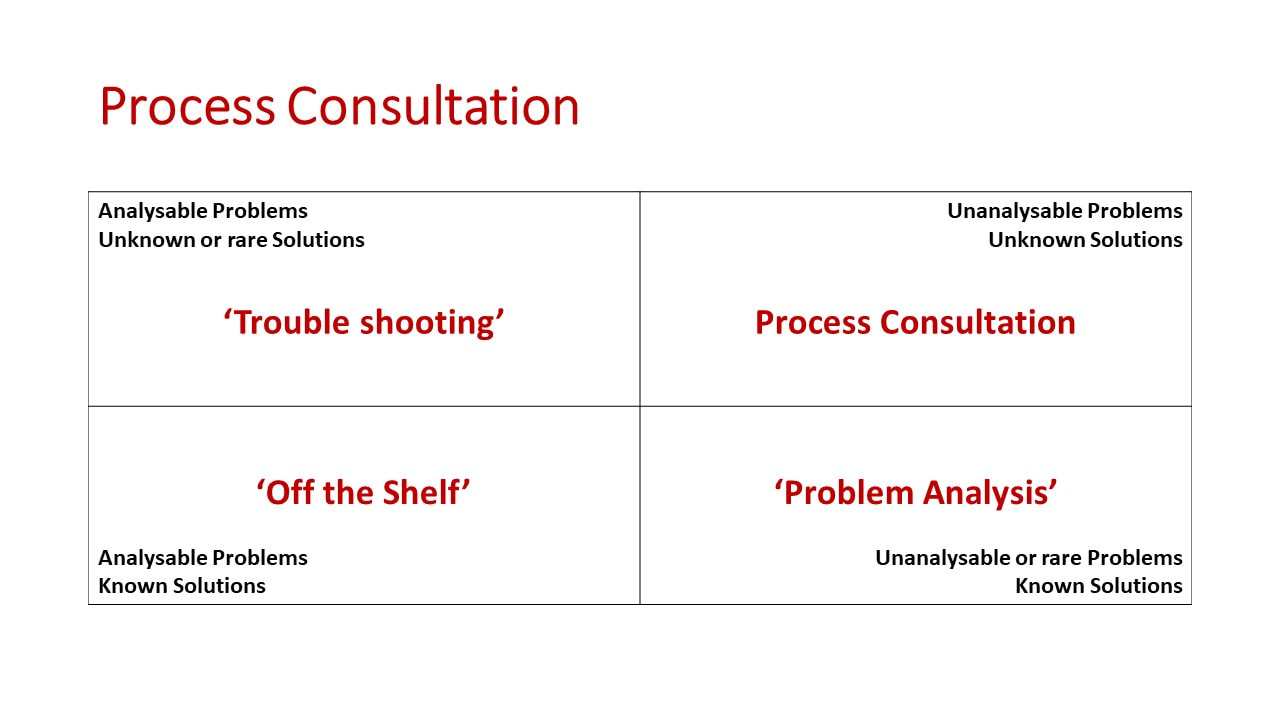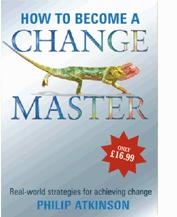Process Consultation, OD & Facilitation
Over the years I have worked on a variety of business transformation projects including leadership, culture change, organisational health checks, quality management, customer focus strategies, Lean, OD, reviewing organisational structures, re-engineering systems and process improvement for a variety of clients in a wide range of sectors and diverse geographies. Clients are interested in knowing our preferences in terms of consulting projects and what we do best.
Content vs. Process
I always explain that the ‘content’ or the ‘label’ is not the issue. Its managing the ‘process of change’ from diagnosis to implementation as a Process Consultant that is the most interesting, challenging and rewarding.
I explain that content is unimportant. Whatever we commit to in terms of achieving desired outcomes, we will never have the shared expertise of our clients, neither will we be able to share in their history, their growth, difficult or challenging incidents and times, and nor will we have an instant answer that can be simply imported from our experience of off the shelf solution. Every intervention is different and that’s why we do what we do.
Expert ‘off the shelf’ Consulting
When many business clients imagine an ideal consultant, they often consider someone who is an expert in their cognate discipline, whether it be strategic planning, marketing, IT or customer and client management. The big consultancy firms advertise their expertise in all sorts of areas.
Supporting clients by providing them with access to depth in cognate disciplines is not the most valuable way of consulting.
OD & Process Consultation
We make the point that every consulting project must be different. Every organisation has a different culture, history, hinterland, structure, systems and management style and so any consulting intervention must be tailored specifically for them, to their circumstances and the demands, constraints and opportunities that they are experiencing.
To explain the work that Process Consultants commit to, I will draw your attention to this diagram attributed to Charles Perrow a leading and legendary specialist in OD theory and practise.
Content vs. Process
I always explain that the ‘content’ or the ‘label’ is not the issue. Its managing the ‘process of change’ from diagnosis to implementation as a Process Consultant that is the most interesting, challenging and rewarding.
I explain that content is unimportant. Whatever we commit to in terms of achieving desired outcomes, we will never have the shared expertise of our clients, neither will we be able to share in their history, their growth, difficult or challenging incidents and times, and nor will we have an instant answer that can be simply imported from our experience of off the shelf solution. Every intervention is different and that’s why we do what we do.
Expert ‘off the shelf’ Consulting
When many business clients imagine an ideal consultant, they often consider someone who is an expert in their cognate discipline, whether it be strategic planning, marketing, IT or customer and client management. The big consultancy firms advertise their expertise in all sorts of areas.
Supporting clients by providing them with access to depth in cognate disciplines is not the most valuable way of consulting.
OD & Process Consultation
We make the point that every consulting project must be different. Every organisation has a different culture, history, hinterland, structure, systems and management style and so any consulting intervention must be tailored specifically for them, to their circumstances and the demands, constraints and opportunities that they are experiencing.
To explain the work that Process Consultants commit to, I will draw your attention to this diagram attributed to Charles Perrow a leading and legendary specialist in OD theory and practise.
You can see from the four quadrants that OD or Process Consultants busy themselves working on projects which are appear unanalysable in terms of problem complexity and solutions in the top right quadrant, while content or subject specialists are usually associated with off the shelf solutions (‘bottom left’ quadrant). ‘Top left’ and ‘bottom right’ interventions require input of leadership by Process Consultants with some input from content specialists.
Projects – working with Unknown Unknowns
Supporting private sector companies who are growing in new markets will require very different change strategies to those in the voluntary sector who are in fear of losing funding and donors, or those in the public sector who must meet the economic needs and demands of Government.
As Process Consultants, we position ourselves from expert consulting and can deliver substantial results, quickly and without unnecessary pain. This form of Process Consulting can also be referred to as strategic facilitation – it is a process which behaviourally qualified trained consultants use to ease the process of change – after all, the terms ‘facilitation’ means ‘to make easy’.
Core Focus on Process Consulting
It is all geared to strategic coaching and working with top team members and their direct reports to support them in the need to define and commit to their own solutions, to learn, develop and grow rather than being spoon fed and told what to do by subject experts.
Bottom line – this means we work with clients to support them in developing solutions to meet the problem as experienced in the real world, rather than defined by experts or technical specialists who have branded or packaged solutions to sell.
No Branded Solutions
Not all consultants are comfortable or proficient in acting as a Process Consultant. It is not easy. There are no right answers. There are no solutions that come pre-branded and locked in A4 binders or videos training that can be instantly accessed to do the worst consulting of all – what has been labelled ‘mass baptism’ or ‘sheep dip’ training and development.
Great theory – lousy implementation
Process consulting requires rigorous organisational diagnosis which must be fact based, with baseline measures to assess progress. We find in many organisations facing complex organisational change that much baseline data is missing, so we must generate a sound method of data generation to ensure that the outcomes we commit to achieving can be measured as we move steadily through the implementation phases.
We come across many interventions where the solutions were not designed to achieve precise and desired outcomes, where the theory does not reflect the actual implementation or solutions that the client has been sold. We do uncover legacy systems and change strategies that are just not fit for purpose and designed for another era and another organisation and wonder how on earth anybody could make them work.
Managing Process vs. Content
The content of a strategic intervention is the ‘what’, and the process is the ‘how’. The expert consultant provides guidance and set solutions, whereas the Process Consultant explores the process.
Working closely with the client, the Process Consultant will scope out the project, bearing in mind desired outcomes from the perspectives of all the key constituents or stakeholders. An expert specialist would proffer tested solutions to a defined problem – a Process Consultant will carefully support the clients in probing to the probable cause of the problems, examining facts and data all the time, establish cause effect relationships, then craft and shape a series of solutions with the client and devise an implementation plan for change.
Summary
The Process Consultant will have to be flexible and spontaneous, experienced in defining, probing, scoping problems, working with key stakeholders and then shaping as to remedy and crafting unique solutions and ensuring they are 100% owned and implemented by the client and their direct reports.
Overall, an expert consultant will ‘tell’ or ‘advise’ a client, and a Process Consultant will support the client in working through all the key stages and issues to effective solution and delivery and ownership of an implementation plan.
The client obviously must decide what variety of consultant they require, and as the complexity of change and business transformation increases so to does the demand for effective process consultation.
Contact Philip Atkinson by email
Projects – working with Unknown Unknowns
Supporting private sector companies who are growing in new markets will require very different change strategies to those in the voluntary sector who are in fear of losing funding and donors, or those in the public sector who must meet the economic needs and demands of Government.
As Process Consultants, we position ourselves from expert consulting and can deliver substantial results, quickly and without unnecessary pain. This form of Process Consulting can also be referred to as strategic facilitation – it is a process which behaviourally qualified trained consultants use to ease the process of change – after all, the terms ‘facilitation’ means ‘to make easy’.
Core Focus on Process Consulting
It is all geared to strategic coaching and working with top team members and their direct reports to support them in the need to define and commit to their own solutions, to learn, develop and grow rather than being spoon fed and told what to do by subject experts.
Bottom line – this means we work with clients to support them in developing solutions to meet the problem as experienced in the real world, rather than defined by experts or technical specialists who have branded or packaged solutions to sell.
No Branded Solutions
Not all consultants are comfortable or proficient in acting as a Process Consultant. It is not easy. There are no right answers. There are no solutions that come pre-branded and locked in A4 binders or videos training that can be instantly accessed to do the worst consulting of all – what has been labelled ‘mass baptism’ or ‘sheep dip’ training and development.
Great theory – lousy implementation
Process consulting requires rigorous organisational diagnosis which must be fact based, with baseline measures to assess progress. We find in many organisations facing complex organisational change that much baseline data is missing, so we must generate a sound method of data generation to ensure that the outcomes we commit to achieving can be measured as we move steadily through the implementation phases.
We come across many interventions where the solutions were not designed to achieve precise and desired outcomes, where the theory does not reflect the actual implementation or solutions that the client has been sold. We do uncover legacy systems and change strategies that are just not fit for purpose and designed for another era and another organisation and wonder how on earth anybody could make them work.
Managing Process vs. Content
The content of a strategic intervention is the ‘what’, and the process is the ‘how’. The expert consultant provides guidance and set solutions, whereas the Process Consultant explores the process.
Working closely with the client, the Process Consultant will scope out the project, bearing in mind desired outcomes from the perspectives of all the key constituents or stakeholders. An expert specialist would proffer tested solutions to a defined problem – a Process Consultant will carefully support the clients in probing to the probable cause of the problems, examining facts and data all the time, establish cause effect relationships, then craft and shape a series of solutions with the client and devise an implementation plan for change.
Summary
The Process Consultant will have to be flexible and spontaneous, experienced in defining, probing, scoping problems, working with key stakeholders and then shaping as to remedy and crafting unique solutions and ensuring they are 100% owned and implemented by the client and their direct reports.
Overall, an expert consultant will ‘tell’ or ‘advise’ a client, and a Process Consultant will support the client in working through all the key stages and issues to effective solution and delivery and ownership of an implementation plan.
The client obviously must decide what variety of consultant they require, and as the complexity of change and business transformation increases so to does the demand for effective process consultation.
Contact Philip Atkinson by email


